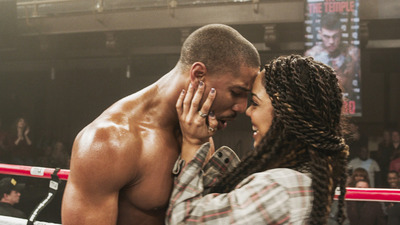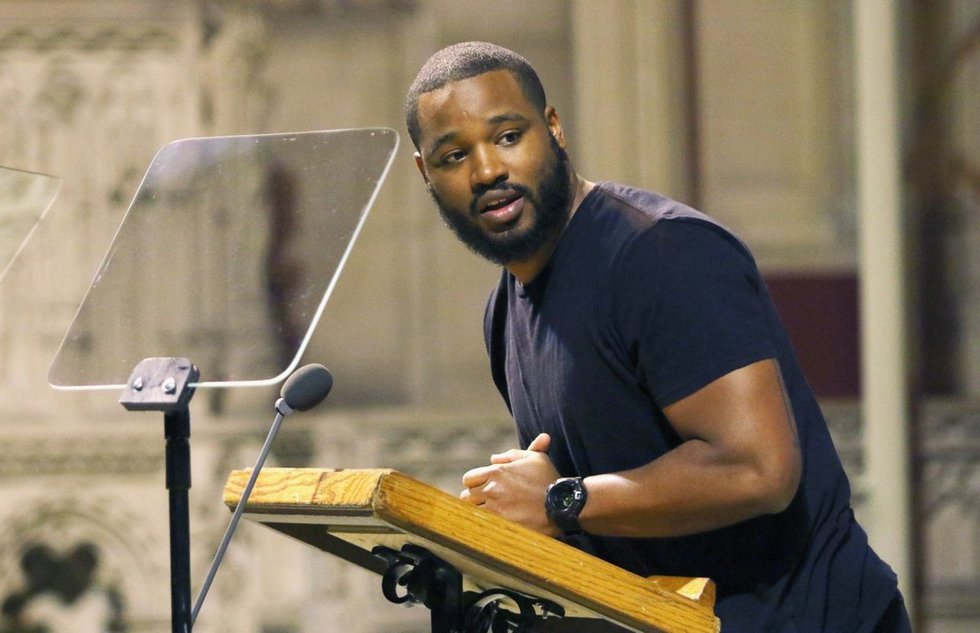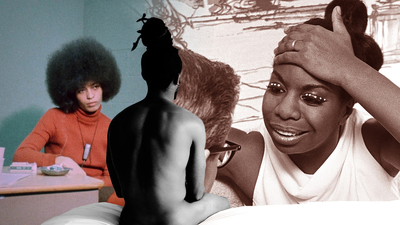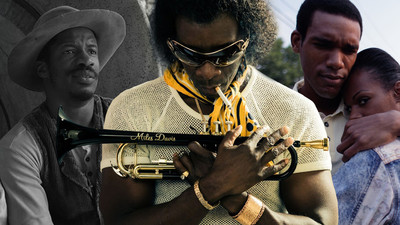
BY MATT BARONE |
Ryan Coogler Explains the Mission Behind This Sunday's #JusticeForFlint Event
The CREED director breaks down why his Blackout For Human Rights network of filmmakers and artists will spend this weekend in Flint, Michigan, where basic human rights have been violated for way too long.

Serious question: Who actually enjoys watching the Oscars pre-show red carpet coverage? Sure, sometimes it's tough to look away from a trainwreck, as in the sight of an E! News correspondent robotically asking stage-trained thespian and Best Supporting Actor nominee Mark Rylance about Bridge of Spies when said interviewer clearly hasn't even seen the film, but this Sunday, there's a meaningful reason to look away—or, more specifically, to direct your attention towards Revolt TV.
While most of the country is currently obsessed with the reality-TV-like circus that is the presidential election, activists and socially minded citizens are concerned with the water crisis that's happening in Flint, Michigan. The impoverished city’s water supply has been tainted by lead poisoning for almost two years, yet the city’s officials and the national government haven’t fixed the problem, causing Flint’s already beleaguered residents to shower in and drink (read: survive on) toxic water.
In response filmmakers Ryan Coogler (Creed) and Ava DuVernay (Selma) and actor Jesse Williams (Grey's Anatomy) are taking action. This Sunday, they’ll travel to Flint, along with the rest of their Blackout For Human Rights collective, to host #JusticeForFlint, a benefit event that will feature live musical performances (from Janelle Monae, Grammy-winning jazz artist Robert Glasper, soul singers Jazmine Sullivan and Musiq Soulchild, Empire's Jussie Smollett, Detroit rapper Royce Da 5’9, and more) and live talks from activists and local community leaders. Scheduled as a send-off of sorts for Black History Month, #JusticeForFlint comes on the heels of Blackout's recent MLK Now event in New York City. The benefit, which will take place at The Whiting Auditorium, will be streamed live via Revolt.tv, at 5:00 p.m. EST.
Yesterday, Coogler and Williams participated in a teleconference call to discuss #JusticeForFlint, along with Robert Glasper, Revolt TV CEO Keith Clinkscales, Michigan Faith in Action director Rick Carter, the Flint Democracy Defense League's Nayyirah Shariff, and Color of Change culture and entertainment advocacy director Brian Walker. Below is an extended excerpt from the call, in which Coogler outlines Blackout For Human Rights’ origins, why they’re so passionate about the Flint situation, and why it’s crucial that A-listers like himself and Ava DuVernay never lose touch with their humble roots.
Ryan Coogler: "Blackout for Human Rights is a collective organization and network of artists, filmmakers, and some folks who aren’t involved in the entertainment industry at all. It started with a group of folks who came together and supported each other whenever news surfaced about a state-sponsored or state-sanctioned violence that happens in our communities. I started in the film industry by making Fruitvale Station, which dealt with one of those circumstances directly: the murder of Oscar Grant on January 1, 2009. By coming into the industry that way, for whatever reason folks who I met and talked to would reach out to me whenever situations like this [one in Flint] would happen, when you have young men and young women who are having their human rights violated by people who are supposed to be paid to protect them."
"So Blackout for Human Rights got started in 2014 around folks deciding to use that form of demonstration and economic unity on Black Friday, which is the biggest shopping day in America. Instead of it being a day about consumerism, we made it a day about activism. We used social media and different platforms to advocate for folks to stay away from shopping and come to these events instead, to save their money while demonstrating for these human rights violations. We did that in 2014 and 2015. And then this past year, we did an event called MLK Now, on Martin Luther King Day. Again, to look at another holiday and make it about activism, and to give folks a place to leverage our influence and our gifts to benefit the community. Our events are always free to the communities."
As #OscarSoWhite gained traction Hollywood’s finest participated in director Ryan Coogler’s #MLKNOW event. Tessa Thompson, Octavia Spencer, and @MichaelBJordan were among the artists who performed speeches from Civil Rights heroes. Jordan recited a powerful speech by Fred Hampton.
A photo posted by Tribeca (@tribeca) on
"As we all got together to unpack that MLK Now event, the Flint Water Crisis broke out and was on the top of everybody’s minds. This is also an example of a state-sponsored, state-sanctioned human rights violation. We really wanted to do something about it, and we decided to do it around Black History Month and really turn the attention that’s on our people onto our brothers and sisters in Flint. A big concern we had was to give the people of Flint a voice, and to humanize the issue. We wanted to make sure we gave the folks a good night of entertainment. They're a resilient group of people, and what they've really needed is a night to have fun and also vent emotionally and let their voices be heard."
"One of the things we look at with Blackout is the idea that people say, 'The rich get richer and the poor get poorer,' but what we’ve found is that the poor only get poorer if they get systematically attacked. They get systematically attacked by the people who are supposed to protect them, so it’s literally the people they’re paying. Poor people pay for expensive water bills, only to see that water poison their children. And also, the people who poison their children are never brought to justice."
"Being a filmmaker myself, one of the things I’ve seen is that, so often, people donate things or give money but then they never have a chance to connect with people on the ground. They don't have a chance to walk the neighborhoods and make sure that the money they’ve donated has been delivered the right way. And that takes time. Fifteen members of our team will be on the ground in Flint this Sunday building with the people and hearing their stories firsthand. You can order 1,000 bottles of water, but if you're not on the ground, who knows if that’s gonna get to where it needs to go. And who knows if 1,000 bottles is really what the people need."

"Look, Jesse is from Chicago and the streets of Brooklyn; Ava DuVernay is from Compton; I'm from the streets of Richmond, California, and the streets of Oakland, California. Even though I’m now a successful filmmaker, she’s a successful filmmaker, and Jesse is a successful actor, what we went through in those neighborhoods is what helped us achieve success, and we're really all about giving back and never truly leaving those neighborhoods and other neighborhoods that are like that. I was on the phone with [Golden State Warriors all-star power forward] Draymond Green last night, who's from Saginaw, Michigan, which is up the street from Flint; his heart goes out to the people of Flint and he wants to support them. Blackout really wants to change the conversation in our culture on how we give back. It’s about making sure we physically go to the communities and never leave them behind."
"We talk about this idea of philanthropy all the time. For you to be a philanthropist, or a successful philanthropist, you have to have a certain level of privilege. So often, the people you see doing philanthropy come from outside what we like to call 'the minority communities,' and it's because they can—they have that luxury. They're not worried about where their next meal is coming from. And even the successful ones of us, the successful African-Americans and the successful Hispanics who come from these types of neighborhoods, because we grew up struggling and because we grew up not knowing where our next meal was coming from, that sense of paranoia never truly leaves. Even when you've beaten the odds and you become privileged, you still think, 'Man, if I take my foot off of the gas, or if I take my eye off of the ball, all of this can leave me.' Because you're haunted by the situation that you grew up in. So for us, we’re really just trying to conquer that, so that the people of Flint do see that it’s us helping us."
The #JusticeForFlint benefit event was live-streamed via Revolt TV on Sunday, February 28. Footage from the event can be seen in the short doc The Truth About Flint; watch it here:



